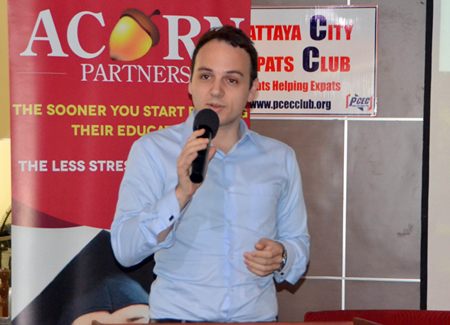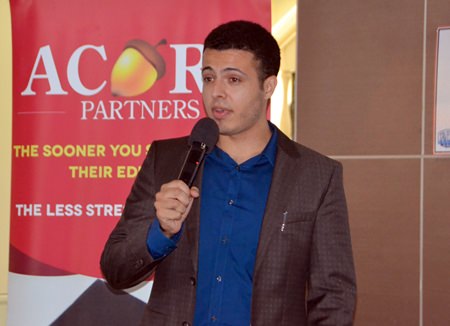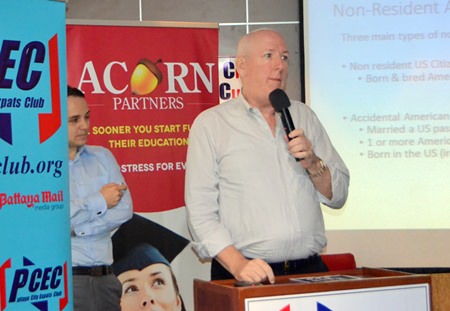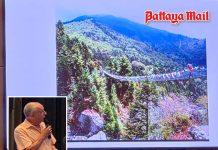Many U.K. and U.S. expats may be able to take action to maximise the value of their retirement savings. This was the central message of a “Financial Educational Road Show” presentation by Acorn Wealth Management at the Pattaya City Expats Club meeting on Sunday, April 26. Acorn was represented at the road show by Glenn Reidie, Jeffrey Gilbert and Idris Asghar.
Glenn is British and has been living in Thailand for nearly 5 years, working across Asia in consulting positions and brand management for a number of clients. In this time he has also been involved in business start ups.
 Glenn Reidie tells his PCEC audience about Acorn Wealth Management and the purpose of their presentation being to describe how U.K. and U.S. expats may be able to maximise the value of their retirement savings.
Glenn Reidie tells his PCEC audience about Acorn Wealth Management and the purpose of their presentation being to describe how U.K. and U.S. expats may be able to maximise the value of their retirement savings.
Idris is British and has been in the finance industry for almost 10 years working as a Corporate Regional Manager at HSBC HQ in London and for some time in wealth management in Thailand.
Jeffrey is an American national and an expert in USEP American tax efficient pensions; he has been working in the finance industry since 1999 and has worked across the world in a number of the world’s financial hubs. He has lived in Thailand for many years and is settled here.
Glenn explained that Acorn Wealth management is an investment company with offices around the world with $7 billion under management. They have two offices in Thailand – in Bangkok and Hua Hin – with a third office opening soon in Pattaya. Glenn said that Acorn also offers health insurance at very competitive rates.
 Idris Asghar explains to the PCEC’s U.K. members and guests the problems with U.K. company pensions and how to move their retirement funds offshore using a QROPS to substantially lower their tax liability.
Idris Asghar explains to the PCEC’s U.K. members and guests the problems with U.K. company pensions and how to move their retirement funds offshore using a QROPS to substantially lower their tax liability.
Idris spoke about UK pensions. He said that expatriates who have a pension from a U.K. company should seriously consider moving their pensions outside the U.K. because 80% of company pension schemes in the U.K are now seriously in a deficit position. Further, almost 1,200 of the 7,800 pension schemes have gone bust. In addition, about 60% of U.K. pension scheme money is invested in government bonds rather than equities, thus providing little opportunity for growth.
He mentioned other problems with U.K. pensions such as all pension income is subject to U.K. income tax at the highest marginal rate. Also, if the pensioner passes away and his or her beneficiary elects to take the pension as a lump sum, it is subject to an inheritance tax of 55%.
 Jeffrey Gilbert describes a US Expat Pension scheme called USEP that, similar to the U.K.’s QROPS, will allow U.S. expats to transfer their retirement funds to Malta, which can also reduce their tax liability under the terms of the U.S.-Malta Tax Treaty.
Jeffrey Gilbert describes a US Expat Pension scheme called USEP that, similar to the U.K.’s QROPS, will allow U.S. expats to transfer their retirement funds to Malta, which can also reduce their tax liability under the terms of the U.S.-Malta Tax Treaty.
U.K. pensioners who have been living outside the U.K. for at least five years, or have the intention of so doing, have the option of transferring their pension to another jurisdiction – such as Gibraltar, Malta or New Zealand – under a scheme called the Qualifying Recognised Overseas Pension Scheme, or QROPS. According to the Idris, this results in the pensioner paying zero or 2.5% tax on income (versus 45% in the U.K.). In addition, beneficiaries are able to avoid inheritance tax. However, not every pension scheme can be transferred overseas once the pensioner has started receiving payments. To quality for QROPS, the transfer value of the pension must be at least £25,000.
Jeffrey spoke about retirement income for U.S. expats. He explained that Americans have something similar to QROPS. It is called “USEP” (for U.S. Expat Pension) and Jeffrey said it is exempt from the U.S. Foreign Account Tax Compliance Act (FACTA). Jeffrey said that U.S. expatriates accumulating retirement savings in their own name will be subject to U.S. tax on the interest, dividends, gains and other income arising from those savings. However, under the provisions of the U.S.-Malta tax treaty, these retirement savings could accumulate within a USEP without being subject to U.S. tax. On reaching retirement, the savings could be paid out under Malta rules, which include a tax-free lump sum amount of at least 30%.
 PCEC’s Ren Lexander interviews Jeffrey Gilbert about his presentation. The interview with all three presenters can be viewed at: https://www.youtube.com/watch?v=J8V9UroTEpE
PCEC’s Ren Lexander interviews Jeffrey Gilbert about his presentation. The interview with all three presenters can be viewed at: https://www.youtube.com/watch?v=J8V9UroTEpE
Jeffrey explained that U.S. expats with their retirement funds in a 401(k) can transfer these funds into a USEP without it being considered a withdrawal and thus subject to taxation at the time of transfer. However, if the retirement funds are in a individual retirement account (IRA), they could not be transferred direct into a USEP. But IRAs can be transferred into a 401(k) without a tax penalty. Then the 401(k) could then be transferred into a USEP.
After the presentation, MC Richard Silverberg brought everyone up to date on upcoming events and called on Roy Albiston to conduct the Open Forum, where questions are asked and answered about Expat living in Thailand, especially Pattaya.
For more information on the PCEC’s many activities, visit their website at www.pcecclub.org.




